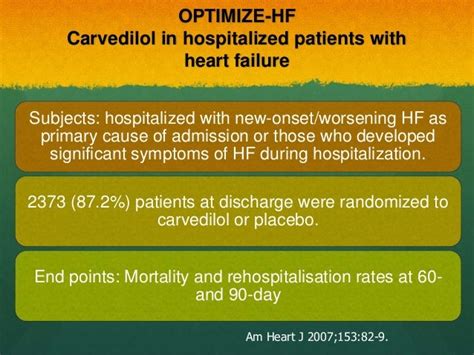Carvedilol: Relieves Heart Failure Symptoms

Heart failure, a chronic and progressive condition where the heart is unable to pump enough blood to meet the body’s needs, affects millions of people worldwide. It is a complex syndrome that can result from various factors, including coronary artery disease, high blood pressure, diabetes, and heart valve problems. The management of heart failure involves a multifaceted approach, including lifestyle modifications, medications, and in some cases, device therapy or surgery. Among the medications used to treat heart failure, carvedilol has emerged as a cornerstone in the management of this condition due to its profound effects on symptoms and survival.
Introduction to Carvedilol
Carvedilol is a beta-blocker with additional alpha-1 adrenergic blocking activity, which distinguishes it from other beta-blockers used in the treatment of heart failure. This unique pharmacological profile allows it to provide benefits beyond those of traditional beta-blockers, including vasodilation and antioxidant effects. Its mechanism of action involves reducing the heart rate and the force of the heart’s contractions, which lowers blood pressure and increases the efficiency of the heart. By doing so, carvedilol decreases the workload on the heart, reducing the symptoms of heart failure such as shortness of breath, fatigue, and swelling in the legs and ankles.
Clinical Evidence Supporting Carvedilol Use
Numerous clinical trials have demonstrated the efficacy of carvedilol in improving symptoms, enhancing quality of life, and reducing morbidity and mortality in patients with heart failure. The CAPRICORN trial, for example, showed that carvedilol significantly reduced the risk of all-cause mortality or hospitalization due to cardiovascular events. Similarly, the COPERNICUS trial demonstrated that carvedilol improved survival and reduced hospitalizations in patients with severe heart failure. These findings have led to the inclusion of carvedilol in guidelines for the management of heart failure, solidifying its position as a first-line therapy for this condition.
Comparative Analysis with Other Beta-Blockers
While all beta-blockers have been shown to be effective in the treatment of heart failure, carvedilol’s unique properties may offer additional benefits over other agents in this class. For instance, its alpha-1 blocking activity contributes to vasodilation, potentially improving cardiac output without significantly increasing heart rate. This could be particularly advantageous in patients with severe heart failure or those who are sensitive to the negative inotropic effects of beta-blockers. However, the choice of beta-blocker in heart failure management should be individualized, considering factors such as comorbid conditions, potential side effects, and patient tolerance.
Historical Evolution of Heart Failure Management
The approach to managing heart failure has undergone significant evolution over the decades. Historically, treatment focused on relieving symptoms with diuretics and digitalis. The introduction of angiotensin-converting enzyme (ACE) inhibitors marked a significant shift towards neurohormonal modulation, aiming to counteract the pathophysiological processes driving heart failure progression. The subsequent addition of beta-blockers, including carvedilol, further enhanced the therapeutic arsenal by providing a complementary mechanism of action that addresses the adverse effects of sympathetic nervous system activation in heart failure.
Practical Application Guide
For patients initiating carvedilol for heart failure, it is crucial to start with a low dose and gradually increase it over time to minimize potential side effects such as dizziness or worsening heart failure symptoms. Regular monitoring of blood pressure, heart rate, and renal function is also essential. Patients should be educated on the importance of adherence to their medication regimen and the need for follow-up appointments to adjust their treatment plan as necessary.
Decision Framework for Initiating Carvedilol
The decision to initiate carvedilol in a patient with heart failure should be based on a comprehensive assessment of their clinical profile, including the severity of symptoms, left ventricular function, and presence of comorbid conditions. The following criteria can serve as a guideline: - Presence of symptomatic heart failure (NYHA Class II-IV) - Left ventricular ejection fraction (LVEF) ≤40% - Absence of contraindications to beta-blockade (e.g., severe bronchospastic disease, decompensated heart failure) - Ability to tolerate the potential side effects of carvedilol
Future Trends Projection
As the landscape of heart failure management continues to evolve, future trends are likely to involve a more personalized approach to therapy, integrating genetic profiling, biomarker-guided treatment, and advanced technologies such as wearable devices and telemedicine. The development of new therapeutic agents and the exploration of novel uses for existing drugs, such as the application of carvedilol in other cardiovascular conditions, will also play a significant role in shaping the future of heart failure care.
FAQ Section
What are the common side effects of carvedilol?
+Common side effects include dizziness, lightheadedness, fatigue, and diarrhea. However, these effects are often transient and may diminish as the body adjusts to the medication.
Can carvedilol be used in patients with asthma or chronic obstructive pulmonary disease (COPD)?
+Carvedilol should be used with caution in patients with asthma or COPD. While it has a more favorable profile compared to non-selective beta-blockers, it can still precipitate bronchospasm in susceptible individuals. Therefore, alternative treatments should be considered, and if carvedilol is deemed necessary, it should be initiated under close supervision.
How long does it take to see the benefits of carvedilol in heart failure?
+The benefits of carvedilol in heart failure can be seen within a few weeks to months after initiation. However, the full effects on mortality and morbidity may take longer to become apparent, underscoring the importance of long-term adherence to therapy.
In conclusion, carvedilol represents a significant advancement in the treatment of heart failure, offering symptomatic relief, improved quality of life, and enhanced survival. Its unique pharmacological profile, coupled with a robust evidence base, positions it as a foundational element in the management of this complex condition. As the field continues to evolve, the role of carvedilol and other beta-blockers will remain crucial in the multifaceted approach to heart failure care.



